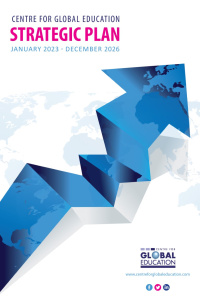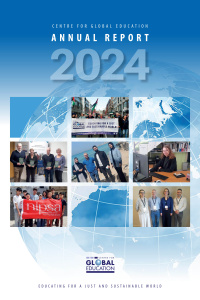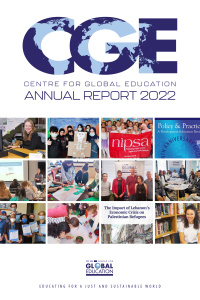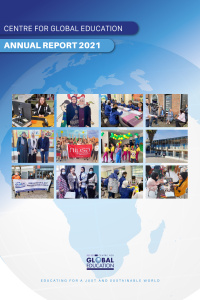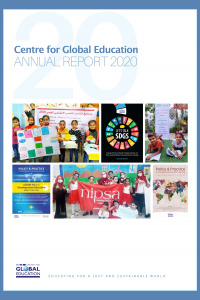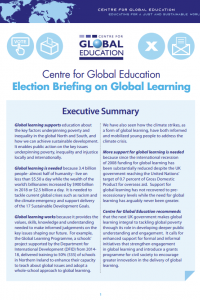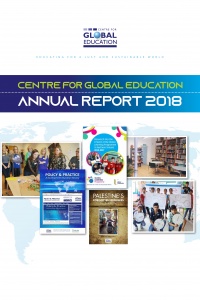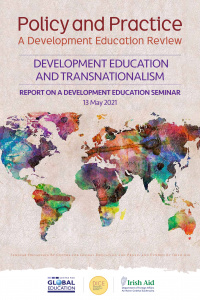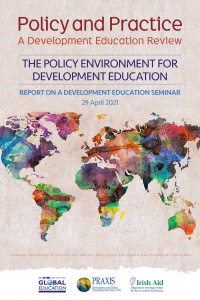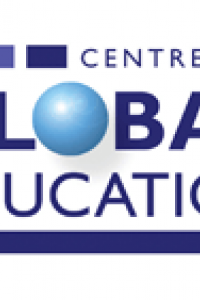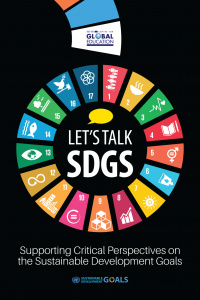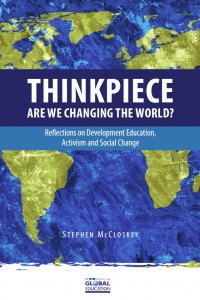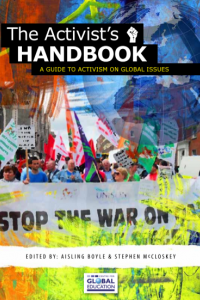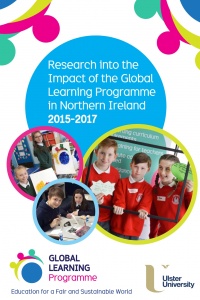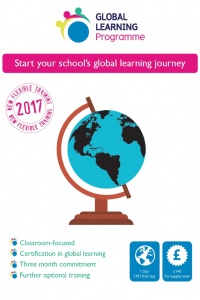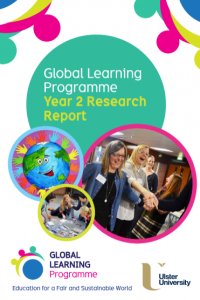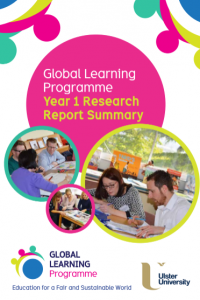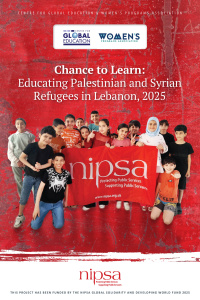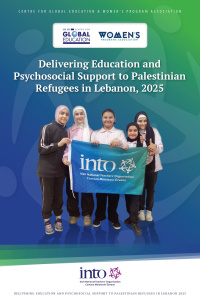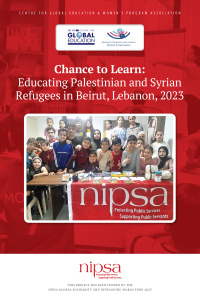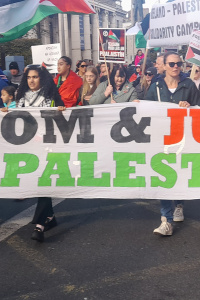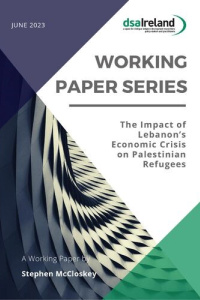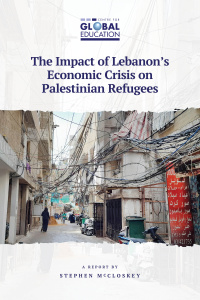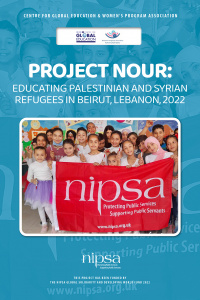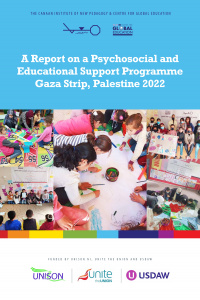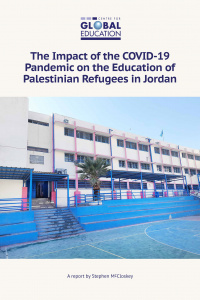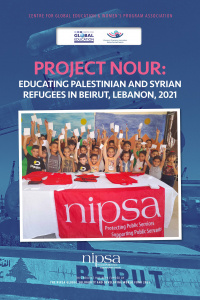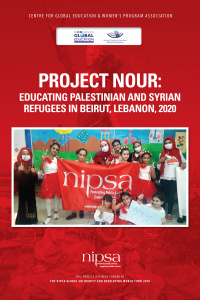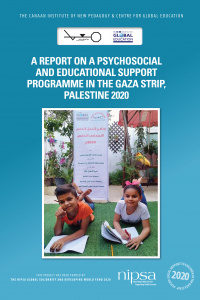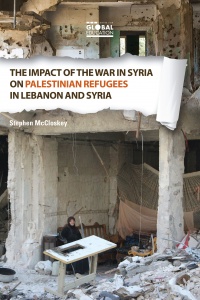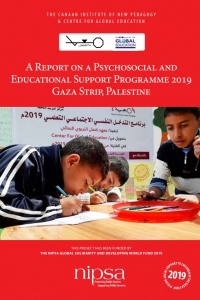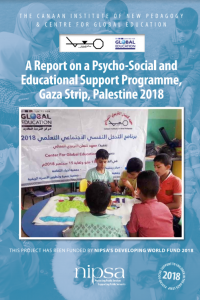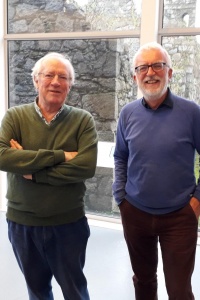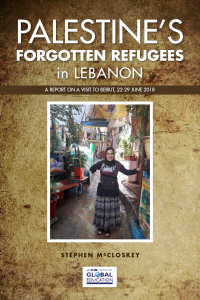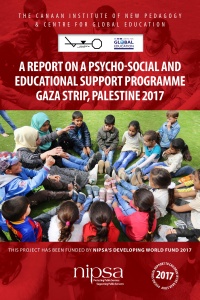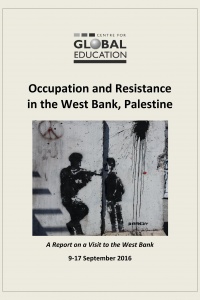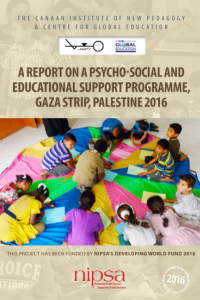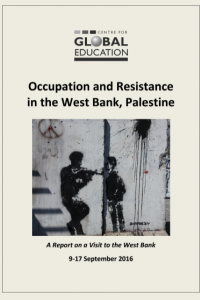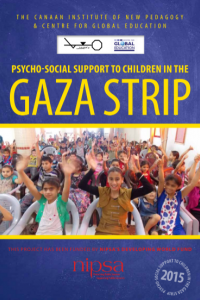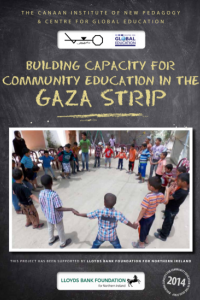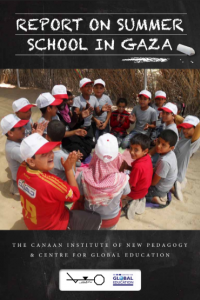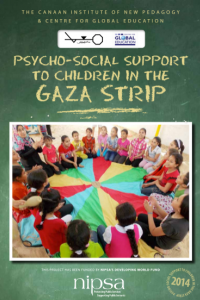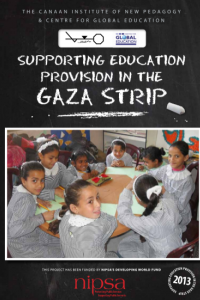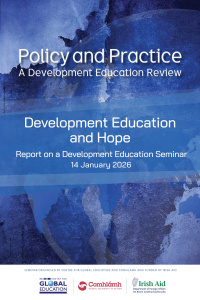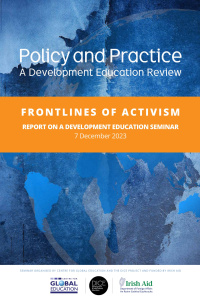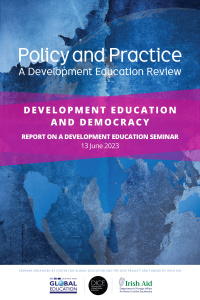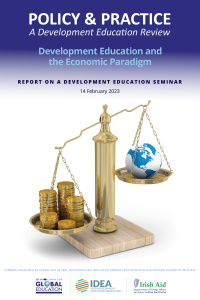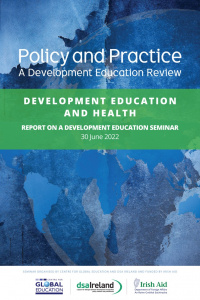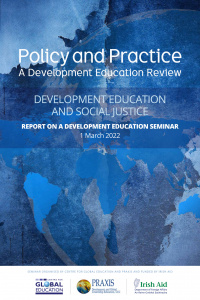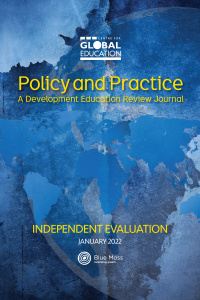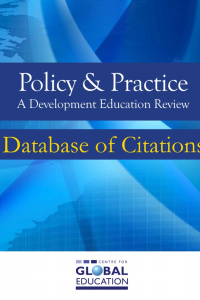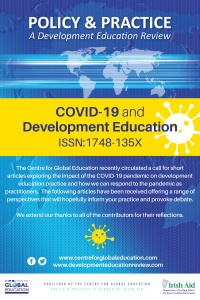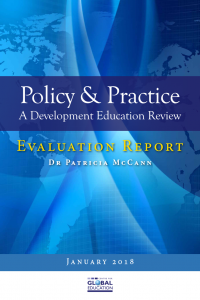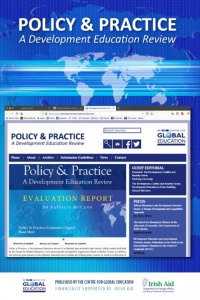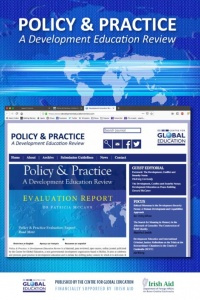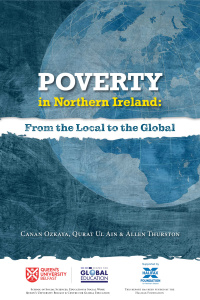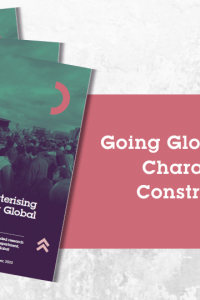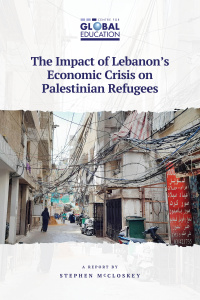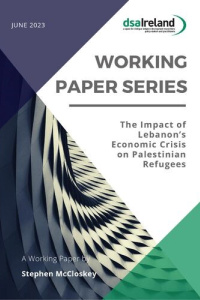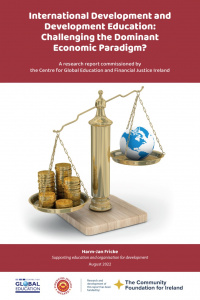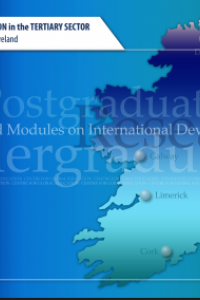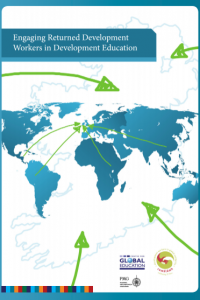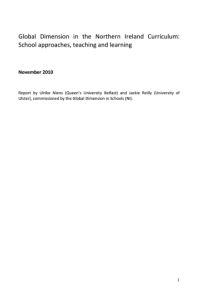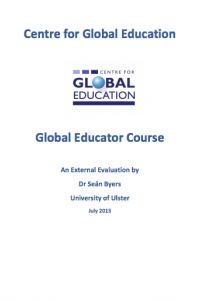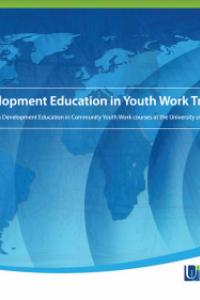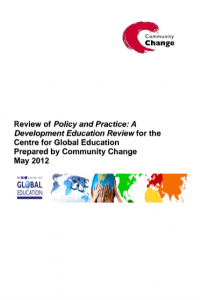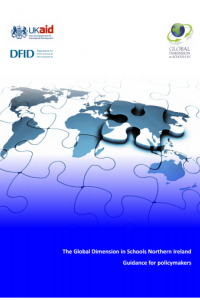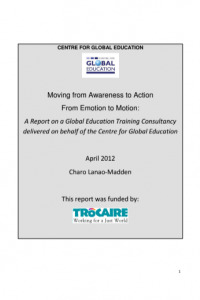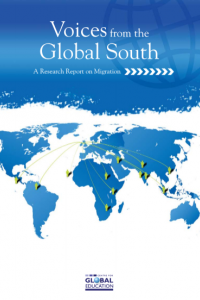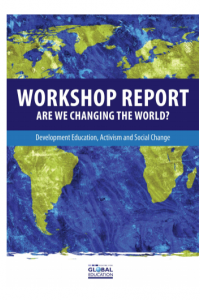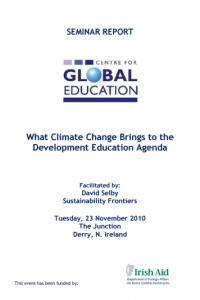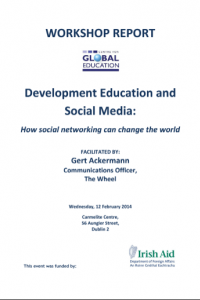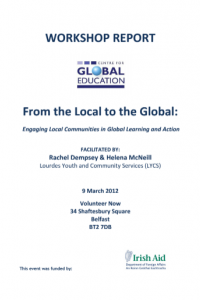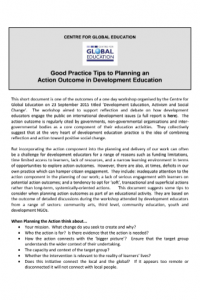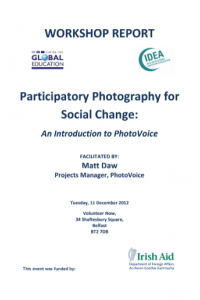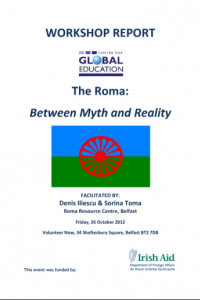CGE Publications
Strategic Planning
|
The Centre for Global Education’s Strategic Plan for the period 1 January 2023 – 31 December 2026 with our Vision, Mission Statement, Focus Areas, Outcomes and Work Areas for the next three years. |
Annual Reports
|
The Centre for Global Education's Annual Report with an overview of our activities in 2024 including audited accounts for the financial year ending 31 March 2024. |
|
An Annual Report covering all of the Centre for Global Education's activities in 2023 including audited accounts for the financial year ending 31 March 2023. |
|
An Annual Report covering all of the Centre for Global Education's activities in 2022 and including audited accounts for the year ending 31 March 2022. |
|
An Annual Report covering all of the Centre for Global Education's activities in 2021 and including audited accounts for the year ending 31 March 2022. |
|
An Annual Report covering all of the Centre for Global Education's activities in 2020. |
|
A Centre for Global Education Election Briefing making the case for the next UK government to increase funding for global learning and ensure more provision of education on global issues in formal and informal education settings. |
|
An Annual Report covering all of the Centre for Global Education's activities in 2018. |
Audited Accounts
|
A full set of the CGE's audited accounts for the financial year ending 31 March 2024. |
|
A full set of the CGE's audited accounts for the financial year ending 31 March 2023. |
|
A full set of the CGE's audited accounts for the financial year ending 31 March 2022. |
|
A full set of the CGE's audited accounts for the financial year ending 31 March 2021. |
|
A full set of the CGE's audited accounts for the financial year ending 31 March 2020. |
|
A full set of the CGE's audited accounts for the financial year ending 31 March 2019. |
General Publications
|
This is a report on a development education seminar organised by the Centre for Global Education in partnership with the Development and Intercultural Education (DICE) Project held online on 13 May 2021. The workshop was titled Development Education and Transnationalism and debated the content of Issue 32 of the Centre for Global Education’s journal Policy and Practice: A Development Education Review. This report carries a recording of the seminar and the presentations of the speakers: Romina De Angelis, Chris O’Connell & Benjamin Mallon, Son Gyoh and Nita Mishra. |
|
This is a report on a development education seminar organised by the Centre for Global Education in partnership with the Praxis project (University College Cork Development and Global Citizenship Education) held on 29 April 2021. The seminar debated the content of Issue 31 of the Centre for Global Education’s journal Policy and Practice: ADevelopment Education Review which is on the theme “The Policy Environment for Development Education”. |
|
The Centre for Global Education’s submission to Irish Aid as part of the consultation process on the new Irish Aid Development and Global Citizenship Education Strategy for 2021- 2024 |
|
This resource is an invitation to development educators to critically interrogate the Sustainable Development Goals and discuss their capacity to deliver upon their intended outcomes. It invites users to ask if the SDGs can support effective global learning and represent a sound critique of the international system. The resource is a useful starting point for a critical discussion on the Goals' capacity for effective advocacy and education toward the eradication of poverty and inequality. |
|
Reflections on Development Education, Activism and Social Change. This article has been published as part of a one year development education project delivered by the Centre for Global Education and funded by Trócaire. It aims to support reflection and debate on how development educators engage the public on international development issues. The article comes on the back of recent research, most notably Oxfam’s Finding Frames report, which suggests that the development sector is struggling to enhance and sustain citizenship engagement on the structural causes of poverty and inequality. The article probes some of the factors that may underpin this lack of engagement both within the development education sector specifically and the wider development sector more generally. It examines some of the challenges involved in engaging learners in actions on global issues. Some of these challenges relate to the sectors and environmental pressures in which development educators operate which can thwart in-depth engagement with learners. |
|
A practical guide to individuals and organisations interested in taking the step from concern about global injustices to action that will change the world for the better. |
Global Learning Programme
|
An at-a-glance summary of the findings documented in the full version of the Research Report conducted on the impact of the Global Learning Programme in Northern Ireland from 2015 to 2017. |
|
A summary of the findings documented in the full version of the Research Report conducted on the impact of the Global Learning Programme in Northern Ireland from 2015 to 2017. |
|
Research into the Impact of the Global Learning Programme in Northern Ireland 2015-2017. |
|
Updated general information about the Global Learning Programme for schools. |
|
A research report on the second year of the Global Learning Programme. |
|
The Global Learning Programme (GLP) is a three-year, formal sector project funded by theDepartment for International (DFID) and managed by the Centre for Global Education (CGE). Theproject aims to increase and improve delivery of global learning in 50% of grant aided primary,secondary and special schools in Northern Ireland. |
Palestine
|
This is a report on education activities delivered in year two of a two-year project (2024-2025) in three Palestinian refugee camps in Lebanon: Burj Barajneh camp in Beirut, and El Buss and Rashidieh camps in Tyre. The project delivered formal education classes and psychosocial support to 100 children, aged 12-16 years, at risk of dropping out of school. The project was jointly managed by the Centre for Global Education (CGE) and the Women’s Programs Association, a Palestinian NGO based in Lebanon. The project was funded by the Northern Ireland Public Service Alliance (NIPSA) Global Solidarity and Developing World Fund. The activities described in this report were delivered from 01 April to 31 September 2025. |
|
This is a report on formal education training and psychosocial support delivered to 45 Grade Six (Elementary) Palestinian children aged twelve years living in Ein El-Hilweh refugee, Saida, Lebanon. The project was jointly managed by the Centre for Global Education (CGE) and our partner in Lebanon, the Women’s Programs Association (WPA), a Palestinian NGO. The project was funded by the Irish National Teachers' Organisation (INTO) Solidarity Fund. |
|
A report on year one of a two-year project providing formal education training to 100 Palestinian and Syrian refugee children aged 12-16 years living in three refugee camps in Lebanon (Burj Barajneh camp in Beirut, and El Buss and Rashidieh camps in Tyre). The project is delivered to children who have dropped out of school, to enhance their access to educational opportunities and skills development, and to enable them to resume their journey in education. The project is funded by NIPSA's Global Solidarity and Developing World Fund. |
|
This is a report on the second year of an edcucation and psychosocial support programme delivered to Palestinian and Syrian refugee children aged 6-14 years in Mar Elias refugee camp, Beirut between March and August 2023. The project was jointly managed by the Centre for Global Education (CGE) and the Women’s Program Association, a Palestinian NGO based in Lebanon. The project was funded by the Northern Ireland Public Service Alliance (NIPSA) Global Solidarity and Developing World Fund. |
|
The Centre for Global Education has produced a guide with suggested actions and resources that aim to enhance understanding of and inform activism on the crisis in Gaza. As a development education centre committed to social justice and equality, CGE believes it is important that we are informed about the root causes of the current conflict and how it might be addressed. The information below is drawn from international and development agencies working in the field and solidarity organisations working on the crisis in Ireland. |
|
This report assesses the impact of Lebanon’s current economic crisis on the socio-economic status of 180,000 Palestinian refugees living in the country. Since 2019, Lebanon’s economy has been locked in a prolonged crisis triggered by a debt default that has seen the currency lose 98 per cent of its value and inflation rocket to 200 per cent. This has caused a surge in the prices of daily necessities such as food, domestic fuel and transportation. Palestinians have been on the frontline of this economic crisis. Displaced from their homeland since 1948, Palestinian refugees in Lebanon have never been naturalized, are excluded from 39 syndicated occupations and denied property rights. Their marginal status has been exacerbated by the arrival of 29,000 Palestinian Refugees from Syria (PRS) who have fled the civil war in Syria. This has created a race to the bottom in terms of competition for low paying jobs in the informal sector. Palestinians have also been severely impacted by the COVID-19 pandemic, and their health, education and living conditions are deteriorating as a consequence of Lebanon’s economic meltdown. The report is based on three field visits to nine Palestinian camps in Lebanon in 2022 and the latest research by UN agencies working in the country. |
|
This report assesses the impact of Lebanon’s four-year economic crisis on the social and economic conditions experienced by Palestinians. The report is based on field visits carried out in May, September and November 2022 to nine Palestinian refugee camps in Lebanon. The report focuses specifically on the health, education and the socio-economic status of Palestinians in Lebanon since the precipitous collapse of Lebanon’s economy in 2019. The marginalisation of Palestinians in Lebanese society has left them particularly vulnerable to the sharp economic contraction of recent years. Published May 2023. |
|
This is a report on education and psycho-social activities delivered to 100 Palestinian and Syrian refugee children aged 6-12 years living in Burj Barajneh refugee camp, Beirut. The project was jointly managed by the Centre for Global Education and the Women’s Program Association, a Palestinian NGO based in Lebanon. The project was funded by the Northern Ireland Public Service Alliance (NIPSA) Global Solidarity and Developing World Fund. |
|
This report describes the activities of an education and psychosocial support programme in the Gaza Strip, Palestine in 2022 funded by three trade unions: Unison NI, Unite the Union and USDAW. The project provided community-based learning opportunities for 400 children, aged 7-12 experiencing mental health problems caused by severe poverty and the constant exposure to conflict. The project activities enhanced the children’s knowledge and understanding of key areas of the schools’ curriculum such as literacy and numeracy, and used interactive development education methodologies to provide psychosocial care. |
|
This report is based on a study visit to Palestinian refugee camps in Jordan in November 2021 with the aim of identifying how the COVID-19 pandemic has impacted on the education of Palestinian refugees both during the lockdown period when schools were closed from mid-March 2020 until the middle of August 2021, and since the resumption of face-to-face teaching in August 2021. The itinerary undertaken by CGE included four refugee camps - Amman New Camp, Marka, Jabal El-Hussein and Jerash – which are located in four different education areas in Jordan (North Amman, South Amman, Zarqa and Irbid). The report identifies issues that cut across all four areas which had impacted on teaching staff and students in the schools visited in each camp. |
|
This is a report on an educational project delivered to 100 Palestinian and Syrian refugee children, aged 6-13 years, who are unable to attend school and suffering from the acute effects of trauma caused by exposure to severe poverty in Burj Barajneh refugee camp Beirut, Lebanon. The project provided formal education in a community setting, to enhance the young people’s understanding of key areas of the schools’ curriculum including literacy and numeracy. The project also provided psychosocial care to help address mental health problems among the child participants caused by the severe social and economic problems in the refugee camp. This was the second year of a two-year project (2020-2021) jointly managed by the Centre for Global Education (CGE) and the Women’s Program Association, a Palestinian NGO based in Lebanon. The project was funded by NIPSA.
|
|
This is a report on an educational project delivered to 75 Palestinian and Syrian refugee children, aged 7-12 years, suffering from the acute effects of trauma caused by exposure to severe poverty in therefugee camp of Burj Barajneh in Beirut, Lebanon. The project provided formal education in a community setting, to enhance the young people’s understanding of key areas of the schools’ curriculum including literacy and numeracy. The project also provided psychosocial care to help address mental health problems among the child participants caused by the severe social and economic problems in the refugee camp. This was the first year of a two-year project (2020-2021) jointly managed by the Centre for Global Education (CGE) and the Women’s Program Association, a Palestinian NGO based in Lebanon. |
|
This report describes the activities of an education and psychosocial support programme in the Gaza Strip, Palestine in 2020 funded by the trade union NIPSA. The project provided community-based learning opportunities for 400 children, aged 7-12 experiencing mental health problems caused by severe poverty and the constant exposure to conflict. The project activities enhanced the children’s knowledge and understanding of key areas of the schools’ curriculum such as literacy and numeracy, and used interactive development education methodologies to provide psychosocial care.
|
|
This report examines the impact of the near decade long war in Syria on Palestinian refugees. Since 2011, 60 per cent of Palestinian Refugees Syria (PRS) have been displaced at least once, more than 4,000 have been killed and three Palestinian camps in Syria have been destroyed. In the same period, 77,329 Palestinian refugees have been born into highly vulnerable and impoverished communities with the UN reporting 95 per cent of PRS in need of ‘sustained humanitarian assistance’. 29,000 PRS have fled to neighbouring Lebanon where Palestinian Refugees Lebanon (PRL) endure a permanent ‘foreigner’ status without citizenship, property rights and access to nearly 40 occupations. The report considers the impact of the ongoing Syrian war on PRS and PRL in the context of the current economic upheaval in Lebanon, cuts to the budget of the UN agency for Palestinian refugees and the COVID-19 pandemic. |
|
A report on activities delivered in year two of a three-year project in the Gaza Strip, Palestine, jointly managed by the Centre for Global Education (CGE) and the Canaan Institute for New Pedagogy, a Palestinian NGO based in Gaza. The programme is funded by NIPSA’s Global Solidarity and Developing World Fund. The project provided education and psychosocial support services to 400 children, aged 7-12 in four communities in the Gaza Strip. The children are subjected to mental health problems caused by extreme poverty and constant exposure to conflict. |
|
A report on activities delivered in year one of a three-year project in the Gaza Strip, Palestine, jointly managed by the Centre for Global Education (CGE) and the Canaan Institute for New Pedagogy, a Palestinian NGO based in Gaza. The programme is funded by NIPSA’s Developing World Fund. |
|
The following is a transcript of an interview carried out by broadcaster and film-maker Peadar King with Robert Fisk, Middle-East correspondent with The Independent newspaper. The interview was conducted on 18 December 2018 as part of a documentary on Palestinian refugees in Lebanon produced for the series What in the World? The transcript has been reproduced in Policy and Practice with the kind permission of Peadar King and Robert Fisk. |
|
This report is based on a short visit to Lebanon in June 2018 to assess the living conditions of Palestinian refugees and the impact of their marginalised status within Lebanon |
|
A report on activities delivered in year two of a two-year project in the Gaza Strip, Palestine, jointly managed by the Centre for Global Education (CGE) and the Canaan Institute for New Pedagogy, a Palestinian NGO based in Gaza. |
|
A Report on a Visit to the West Bank, 9-17 September 2016 |
|
A report on activities delivered in year one of a two-year project in the Gaza Strip, Palestine, jointly managed by the Centre for Global Education (CGE) and the Canaan Institute for New Pedagogy, a Palestinian NGO based in Gaza. |
|
The Centre for Global Education's Director, Stephen McCloskey, visited the West Bank, Palestine, with a delegation of Irish activists to assess the human rights situation on the ground. A busy itinerary included visits to Bil'in, East Jerusalem, Jenin, Hebron and Ramallah from a base in Bethlehem. The group met with Israeli and Palestinian activists, Palestinian students, a settler and Omar Barghouti, co-founder of the Boycott Divestment Sanctions Movement. |
|
This is a report on a project delivered by the CGE in the Gaza Strip in 2015. The project provided psycho-social support to 300 children suffering acute forms of trauma caused by the ongoing conflict in the region. It was delivered in partnership with the Canaan Institute of New Pedagogy, a Palestinian NGO based in Gaza city. |
|
This is a report on a project in the Gaza Strip, Palestine, delivered by the Centre for Global Education (CGE), a development non-governmental organisation (NGO) based in Belfast, in partnership with the Canaan Institute of New Pedagogy, an NGO based in Gaza. The project was supported by the Lloyds Bank Foundation for Northern Ireland International Grant Programme and delivered from January to May 2014. |
|
A report on a summer school in the Gaza Strip funded by the Centre for Global Education in July 2012 and delivered in partnership with the Canaan Institute of New Pedagogy. |
|
This is a report on a project in the Gaza Strip, Palestine, delivered by the Centre for Global Education (CGE), a development non-governmental organisation (NGO) based in Belfast, in partnership with the Canaan Institute of New Pedagogy, an NGO based in Gaza. The project was funded by the Northern Ireland Public Service Alliance (NIPSA) Developing World Fund and delivered from January to May 2014. |
|
This is a report on an education project in the Gaza Strip, Palestine, delivered by the Centre for Global Education (CGE) in partnership with the Canaan Institute of New Pedagogy, an NGO based in Gaza. The project was funded by the Northern Ireland Public Service Alliance (NIPSA) Developing World Fund and delivered from December 2012 to March 2013. The project’s aim was “to enhance education and psycho-social support services to marginalised young people in the Gaza Strip”. |
Policy and Practice Publications
|
This is a report on an online development education seminar organised by the Centre for Global Education in partnership with Comhlámh held on 14 January 2026. The seminar was titled “Development Education and Hope” and debated the content of Issue 41 of the Centre for Global Education’s journal Policy and Practice: A Development Education Review. The speakers at the seminar were: Benedict Arko, Gerard McCann and Elizabeth Meade, and the chair was Su-ming Khoo. The seminar was organised as part of a three-year development education project funded by Irish Aid.
|
|
This is a report on an online development education seminar organised by the Centre for Global Education in partnership with the DICE Project held on 22 May 2025. The seminar was titled “Development Education and Class” and debated the content of Issue 40 of the Centre for Global Education’s journal Policy and Practice: A Development Education Review. The speakers at the seminar were: Abdellatif Atif, Audrey Bryan, Fiona Creedon and Sally Daly. The report carries the speaker’s presentations and a recording of the Fiona Creedon and Sally Daly presentation. The seminar was organised as part of a three-year development education project funded by Irish Aid.
|
|
The Centre for Global Education’s bi-annual, peer reviewed, open access journal Policy and Practice: A Development Education Review celebrates its twentieth anniversary in 2025. To mark this important milestone for the journal, the Centre for Global Education circulated a call for 500-word articles from academics and practitioners on “The Future of Development Education”. We have been delighted with the response. A total of 15 articles have been received that present reflective and interesting perspectives on the future of the sector. |
|
This is a report on an online development education seminar organised by the Centre for Global Education in partnership with the DICE Project held on 19 November 2024. The seminar was titled “Development Education Silences” and debated the content of Issue 39 of the Centre for Global Education’s journal Policy and Practice: A Development Education Review. The speakers at the seminar were: Mostafa Gamal, Caroline Murphy and Jen Simpson. The report carries their presentations and a recording of the event. The seminar was organised as part of a three-year development education project funded by Irish Aid. |
|
This report sets out the findings of an independent evaluation of the Centre for Global Education’s journal, Policy and Practice: Development Education Review, carried out by Blue Moss. The methodology for stakeholder engagement included an online survey, semi-structured interviews and a focus group. The results of this engagement are presented and discussed in the report and recommendations made for increasing and broadening the journal's readership. |
|
This is a report on an online development education seminar organised by the Centre for Global Education in partnership with Comhlámh held on 14 May 2024. The seminar was titled “Development Education and Migration” and debated the content of Issue 38 of the Centre for Global Education’s journal Policy and Practice: A Development Education Review. The speakers at the seminar were: Elizabeth Meade, Emma Soye and Charles Watters, and Karen Wynne. The report carries their presentations and a recording of the event. The seminar was organised as part of a three-year development education project funded by Irish Aid. |
|
This is a report on a development education seminar organised by the Centre for Global Education in partnership with the Development and Intercultural (DICE) project held on 7 December 2023. The seminar was titled “Frontlines of Activism” and debated the content of Issue 37 of the Centre for Global Education’s journal Policy and Practice: A Development Education Review. The speakers at the seminar were: Gertrude Cotter, Niamh Gaynor and Gabriela Martínez Sainz. The report carries their presentations and a recording of the event. The seminar was organised as part of a three-year development education project funded by Irish Aid. |
|
This is a report on a development education seminar organised by the Centre for Global Education in partnership with the Development and Intercultural (DICE) project held on 13 June 2023. The seminar was titled Development Education and Democracy and debated the content of Issue 36 of the Centre for Global Education’s journal Policy and Practice: A Development Education Review. The speakers at the seminar were: Audrey Bryan, Marta da Costa and Brighid Golden. The report carries their presentations and a recording of the event. The seminar was organised as part of a three-year development education project funded by Irish Aid |
|
This is a report on a webinar held on 14 February 2023 and organised in partnership with the Irish Development Education Association (IDEA), to debate the content of Issue 35 of the Centre for Global Education’s journal Policy and Practice: A Development Education Review which is on the theme “Development Education and the Economic Paradigm”. The report contains video recordings and presentations of the three speakers: Harm-Jan Fricke, Irene Tollefsen and Anders Daniel Faksvåg Haugen. |
|
This is a report on a development education seminar organised by the Centre for Global Education in partnership with Development Studies Association Ireland held on 30 June 2022. The seminar was titled Development Education and Health and debated the content of Issue 34 of the Centre for Global Education’s journal Policy and Practice: A Development Education Review. This report carries a recording of the seminar and the presentations of the speakers: Sadhbh Lee, Ciara Conlan and Charlotte Dwyer. |
|
This is a report on a development education seminar organised by the Centre for Global Education in partnership with in partnership with the Praxis project (University College Cork Development and Global Citizenship Education) held on 1 March 2022. The seminar was titled Development Education and Social Justice and debated the content of Issue 33 of the Centre for Global Education’s journal Policy and Practice: A Development Education Review. This report carries a recording of the seminar and the presentations of the speakers: Shawna M. Carroll, Eilish Dillon & Joyce Raanhuis. |
|
This report sets out the findings on an independent evaluation of the Centre for Global Education’s journal, Policy and Practice: A Development Education Review carried out by Blue Moss. The report assesses the extent to which the journal is building development education capacity locally and globally and strengthening the policy environment for development education practice. |
|
Research into the impact of the Centre's biannual, peer-reviewed journal Policy and Practice: A Development Education Review. The database contains listings of books, scientific journals, dissertations and theses, and NGO reports that have cited articles published in Policy and Practice. The report shows that Policy and Practice articles have generated a total of 5,707 citations - an increase of 443 on 2024 - of which 5,239 were cited in external journals and 468 were found in other Policy and Practice articles Latest update: April 2025. |
|
The Centre for Global Education’s bi-annual journal, Policy and Practice: A Development Education Review, has published a special collection of short articles exploring the impact of the COVID-19 pandemic on development education practice and how we can respond to the pandemic as practitioners. The following twelve articles offer a range of perspectives that will hopefully inform practice and provoke debate. |
|
This research report examines the impact and reception of the Centre's flagship project "Policy & Practice: A Development Education Review". It is based on a survey and other research conducted by Dr Patricia McCann. |
|
An A5 flyer on the Policy and Practice Journal. |
|
|
Research & Consultation Reports
|
This report is the outcome of a systematic literature review from 2020-2024 of poverty reports in Northern Ireland that discern the main drivers of poverty and persistent trends. It also frames poverty in Northern Ireland in a UK, all-Ireland and international context by drawing upon international comparators from Europe and the rest of the world. The report makes informed recommendations that could support effective anti-poverty policy interventions in Northern Ireland. |
 Opinion Piece: Conflict, Climate and Migration in the Context of Gaza 2024In April 2024, the Centre for Global Education contributed an opinion piece under the title: Conflict, Climate and Migration in the Context of Gaza to the Development Studies Association of Ireland which considered the human toll of Israel’s war on Gaza’s civilian population since October 2023. It also considered the carbon footprint of Israel’s war drawing upon ‘A Multi-temporal Snapshot of Greenhouse Gas Emissions from the Israel-Gaza Conflict’ carried out by academics from Lancaster University and Queen Mary University of London. It found that carbon emissions resulting from ‘aircraft missions, tanks and fuel from other vehicles’ including US cargo planes ‘was equivalent to burning at least 150,000 tonnes of coal’. |
|
This research report explores conceptualisations and constructs of global citizenship. “Going Global?” captures the findings of a year-long engaged research project that was led by Dr Barry Cannon of Maynooth University, in partnership with the Centre for Global Education, Comhlámh and Suas. The research included two participative workshops in Belfast and Dublin organised by CGE, Comhlamh and Suas to support an all-island exploration of the meaning and content of global citizenship. |
|
This report assesses the impact of Lebanon’s four-year economic crisis on the social and economic conditions experienced by Palestinians. The report is based on field visits carried out in May, September and November 2022 to nine Palestinian refugee camps in Lebanon. The report focuses specifically on the health, education and the socio-economic status of Palestinians in Lebanon since the precipitous collapse of Lebanon’s economy in 2019. The marginalisation of Palestinians in Lebanese society has left them particularly vulnerable to the sharp economic contraction of recent years. Published May 2023.
|
|
This report assesses the impact of Lebanon’s current economic crisis on the socio-economic status of 180,000 Palestinian refugees living in the country. Since 2019, Lebanon’s economy has been locked in a prolonged crisis triggered by a debt default that has seen the currency lose 98 per cent of its value and inflation rocket to 200 per cent. This has caused a surge in the prices of daily necessities such as food, domestic fuel and transportation. Palestinians have been on the frontline of this economic crisis. Displaced from their homeland since 1948, Palestinian refugees in Lebanon have never been naturalized, are excluded from 39 syndicated occupations and denied property rights. Their marginal status has been exacerbated by the arrival of 29,000 Palestinian Refugees from Syria (PRS) who have fled the civil war in Syria. This has created a race to the bottom in terms of competition for low paying jobs in the informal sector. Palestinians have also been severely impacted by the COVID-19 pandemic, and their health, education and living conditions are deteriorating as a consequence of Lebanon’s economic meltdown. The report is based on three field visits to nine Palestinian camps in Lebanon in 2022 and the latest research by UN agencies working in the country. |
|
This report presents the findings of research into the extent to which the international development and development education sectors are engaging with the current dominant economic system, i.e. neoliberalism/’free market’ economics, and its influence on poverty, inequality and injustice as part of their education work with the public. |
|
A guide to third level courses on development issues and development education in the north and south of Ireland (2008). |
|
A research report commissioned by CGE and Comhlamh on engaging returned development workers in development education practice (2011). |
|
The Global Dimension in Schools (Northern Ireland) is a three year programme aiming to embed the Global Dimension in formal education. |
|
An external evaluation of the Centre for Global Education’s accredited Global Educator Course offered to educators working in, or in support of, the black and minority ethnic sector. |
|
A research report on how development education is currently addressed and could be enhanced in the delivery of community and youth work courses at the University of Ulster, Jordanstown (2009). |
|
Review of Policy and Practice: A Development Education Review for the Centre for Global Education Prepared by Community Change May 2012 |
|
In January 2010, Global Dimension in Schools Northern Ireland commissioned Quinn Research Services to conduct a series of key informant interviews with, and to produce ‘Global Dimension’ policy guidance for stakeholders in formal education and education policy sectors. |
|
Report on a training consultancy involving the piloting and writing of new modules for the Centre for Global Education's accredited Global Educator course. The report contains the outcomes of the training delivered. |
|
A research report exploring the factors that lead to people from the global South coming to live in Northern Ireland and some of the problems they confront when settling here (2010). |
Workshop Reports
|
This is a report on a development education, capacity-building workshop organised by the Centre for Global Education in September 2015. The workshop was titled Are we changing the world: Development Education, Activism and Social Change and held on 23 September in the Carmelite Centre, Dublin. The workshop was organised as the central part of a project funded by Trócaire exploring the relationship between development education, activism and social change. |
|
A report on a one day workshop on Climate Change and Development Education facilitated by David Selby of Sustainability Frontiers. |
|
Workshop report - Development Education and Social Media: How social networking can change the world. Facilitated by: Gert Ackermann. Communications Officer, The Wheel. Wednesday, 12 February 2014 |
|
A report on a CGE one day workshop, From the Local to the Global, organised in partnership with Lourdes Youth and Community Services, and held in Belfast on 9 March 2012. |
|
This short document is one of the outcomes of a one day workshop organised by the Centre for Global Education on 23 September 2015 titled ‘Development Education, Activism and Social Change’. The workshop aimed to support reflection and debate on how development educators engage the public on international development issues (a full report is here). The action outcome is regularly cited by governments, non-governmental organisations and inter-governmental bodies as a core component of their education activities. They collectively suggest that at the very heart of development education practice is the idea of combining reflection and action toward positive social change. |
|
A report on a CGE one day workshop, Participataory Photography for Social Channge: An Introduction to PhotoVoice, held in Belfast on 11 December 2012. |
|
A report on a Centre for Global Education workshop on the Roma community held on 26 October 2012. The workshop used development education methodologies to explore and challenge myths and stereotypes often applied to the Roma community in Ireland. |






